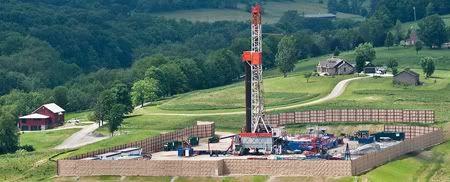No Frackin’ Way!
URGENT:
Controversial Drilling Method Threatens Nova Scotia
So reads the front cover of a leaflet being distributed in our community by concerned citizens. Concerned about what?
 Fracking – or hydraulic fracturing, a method of extracting natural gas from deep underground. Energy companies drill deep wells, then pump in water mixed with sand and chemicals at high pressure. The water shatters the rock bed below ground and the sand keeps the cracks open, thus allowing natural gas to escape and be captured.
Fracking – or hydraulic fracturing, a method of extracting natural gas from deep underground. Energy companies drill deep wells, then pump in water mixed with sand and chemicals at high pressure. The water shatters the rock bed below ground and the sand keeps the cracks open, thus allowing natural gas to escape and be captured.
Fracking has been in use by the energy sector in the U.S.A. since 1947, and an estimated 90% of the natural gas wells there use hydraulic fracturing. So why the uproar?
Opponents of the process assert that very little research has been done on the long-term impact of fracking on human and wildlife health and on the environment. What are the problems?
1) The chemicals used in the fracking process (many of them carcinogens) and the natural gas itself can contaminate ground water – and in communities where most people rely on their own well for drinking water, that’s a tremendous concern.
 The producers of the film Gasland show many examples of ruined wells, including one where the water actually burns when lit. America’s Natural Gas Alliance (ANGA) maintains that these wells were contaminated by other sources, and prior to fracking activities in the area.
The producers of the film Gasland show many examples of ruined wells, including one where the water actually burns when lit. America’s Natural Gas Alliance (ANGA) maintains that these wells were contaminated by other sources, and prior to fracking activities in the area.
2) Fracking requires millions of gallon of water – local water – and thus could lower our ground water levels. Some home water wells may run dry and need to be re-drilled.
3) Much of the water used in the process returns to the surface, now contaminated with such hazardous chemicals as kerosene, benzene, toluene, and formaldehyde, and must be disposed of. The rest of the water and chemicals remains underground.
4) As in all mining operations, large areas of land (4 to 6 acres for each well pad) would be levelled, and roads for heavy equipment built. In a rural environment that depends on its natural beauty to draw visitors, as Nova Scotia does, tourism could decline dramatically.

5) Occasionally, a well will explode, spewing millions of gallons of hydraulic fracturing fluid and combustible gas into the air and onto surrounding landscape.
According to the New York Times, the NYC Department of Environment Protection refused to allow fracking within the NYC watershed, citing “an unacceptable threat to the unfiltered water supply of nine million people”.
And therein lies the rub: in the country, we’re not nine million people. We are only a few, and in the eyes of big business and government (and of people who do not live here), a few whose quality of life can be sacrificed.
This is one of the hazards of country living: unless you own ALL the land, potentially dangerous commercial enterprises can become your close neighbours. Sure, in the city, land might be cleared for a new mall or big box store but, as unattractive as they are, they don’t pose the hazard of a natural gas well, fracking the earth beneath you.
 In Nova Scotia, there will be a demonstration held in front of Province House in Halifax between 1 and 2 p.m. today, to mark Earth Day and to officially register the groundswell of protest against fracking in Nova Scotia.
In Nova Scotia, there will be a demonstration held in front of Province House in Halifax between 1 and 2 p.m. today, to mark Earth Day and to officially register the groundswell of protest against fracking in Nova Scotia.

